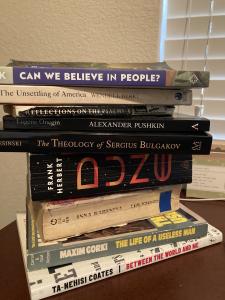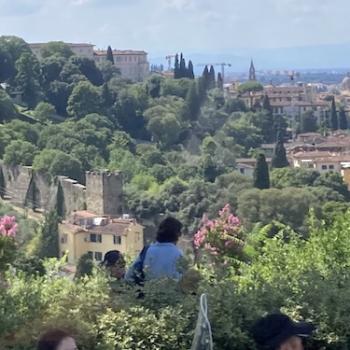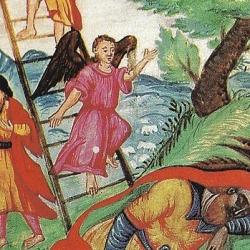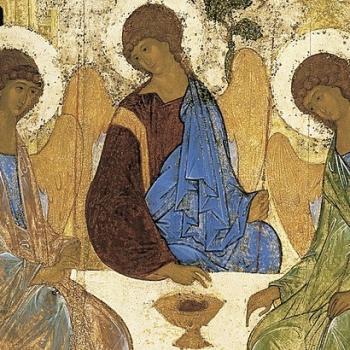
As I’m still in transition between semesters, I thought today might be a good day to include a “best of 2021” column. These are among the best theology books I read last year. Only one of them was actually published in 2021. Here they are, in no particular order.
- The Way of a Pilgrim and The Pilgrim Continues His Way. This anonymous work from Russia in the 19th century became popular among American readers after its translation in the 20th. It’s the story of a Russian man who is shaken by a liturgical reading of Paul’s appeal to “pray without ceasing.” He wanders around Siberia looking for someone who can teach him how. Besides the people he meets, his companions are the New Testament and The Philokalia, an anthology of the Church Fathers. His pilgrimage becomes a metaphor for the life of faith generally. That metaphor is a diagonal one: faith in God takes habit-forming hard work; and faith in God is completely a gift.
- Nicholas of Cusa, On Conjectures. Writing in German at the hinge of the High Middle Ages and the Renaissance era, Nicholas’s writings are a heady exploration of geometry and metaphysics. He was a leading spiritual advisor of his day and region. This text explores the way the work of human discovery can also be a participation in the mind and grace of God. All created being, he says, is in the image of the utterly simple God. Our contemplation of being, then, can be a path to deification, or holiness. This is true when we note the differences between things as well as the unities. It is true when we notice our own failings as well as our successes. All the energy of life belongs, because God made it all and called it good.
- Teresa of Avila, Christian Perfection and The Interior Castle. Saint Teresa is one of two key figures of the Carmelite Order in Spain. The other is her directee, Saint John of the Cross. I finally read her two most important works, which Sarah Coakley challenged me to do back when my first book came out. I wrote a bit about Teresa and forgiveness in my first Patheos publication. There’s a rhythm to her explorations of the life of faith. She loses herself in the mystery of God, and then checks back in on what is happening in her as she confronts the mystery. It’s not exactly diagonal, but you’ll see a family resemblance. In one of my favorite images, she says that the soul is like a bee. It has to fly high enough to see the vast order of the meadow, but then has to descend so that it can select a single flower from which to draw nectar. Life in search of holiness is like that. In prayer, I lose myself in the vast meadow of God’s being. Then I descend and notice the particular ways that God is calling me to be grow towards deification in this moment.
- Eugene Rogers, Elements of Christian Thought. This was a fun one for me. More than two decades ago I had the privilege of serving as a teaching assistant for Gene’s class by the same name at the University of Virginia. I recall a moment in the class, listening to his inimitable way of making things clear, that I made an important discovery. Theology must always be about the mysterious God, but that does not mean it has to be cryptic or obscure. We can use all our best reasoning tools—deduction, analogy, anecdotes—to try to clarify what it is we are trying to say about grace, atonement, and the Triune God. This is exactly what Gene does in this text. It’s moving, it’s gracious and readable, and it’s often is funny. I told him that it made me laugh, and he was surprised. I don’t think Gene has ever realized how witty he is.
- My friend Doug Harrison’s Heart Deck. This one isn’t a book, exactly, but a deck of cards with an accompanying guide to contemplation. I spent several days letting it guide my morning prayers. The cards supply artistic images and a word. “Beauty,” or “Hospitality,” for instance. The contemplation guide suggests some ways to connect the word with the image. In doing so, it takes the reader into scripture, Thomas Aquinas, and other guides to contemplative prayer. I learned so much from it, and I hope that you’ll click that link and purchase it yourself.
- Ta-nehisi Coates, Between the World and Me. I’ve written about this one before as well. It’s not a theology book, but I have an insufferable habit of reading everything as if it were theology. It’s a beautiful and difficult book about being Black in the United States, and I wish everyone would read it. Coates tells his life story in a long letter to his son. The catalyst is his son’s reaction to the acquittal of Michael Brown’s killers in Ferguson, Missouri. As he writes about his childhood in the streets of Baltimore, discovering his Mecca at Howard University, and beginning a career in journalism, Coates has in fact quite a lot to say about faith.
There are others I’d like to tell you about. C.S. Lewis’s book on the Psalms is a wonderful little read. I’ve been exploring quite a bit of eco-theology, and Ellen Davis’s book from 2012 on farming in the Old Testament is gorgeous and challenging. Celia-Deane Drummond has written a sort of book of field notes with amazing discoveries of theological resonances in the animal kingdom. And it’s got an orangutan on the cover. So you pretty much know you can trust it. Then there’s all that Russian fiction I keep coming back to. *Sigh.* Another time.
Send me a note on Facebook or Twitter and let me know what you’ve been reading, or what you think I should have read last year. Thanks, as always, for reading my column.
-Tony











